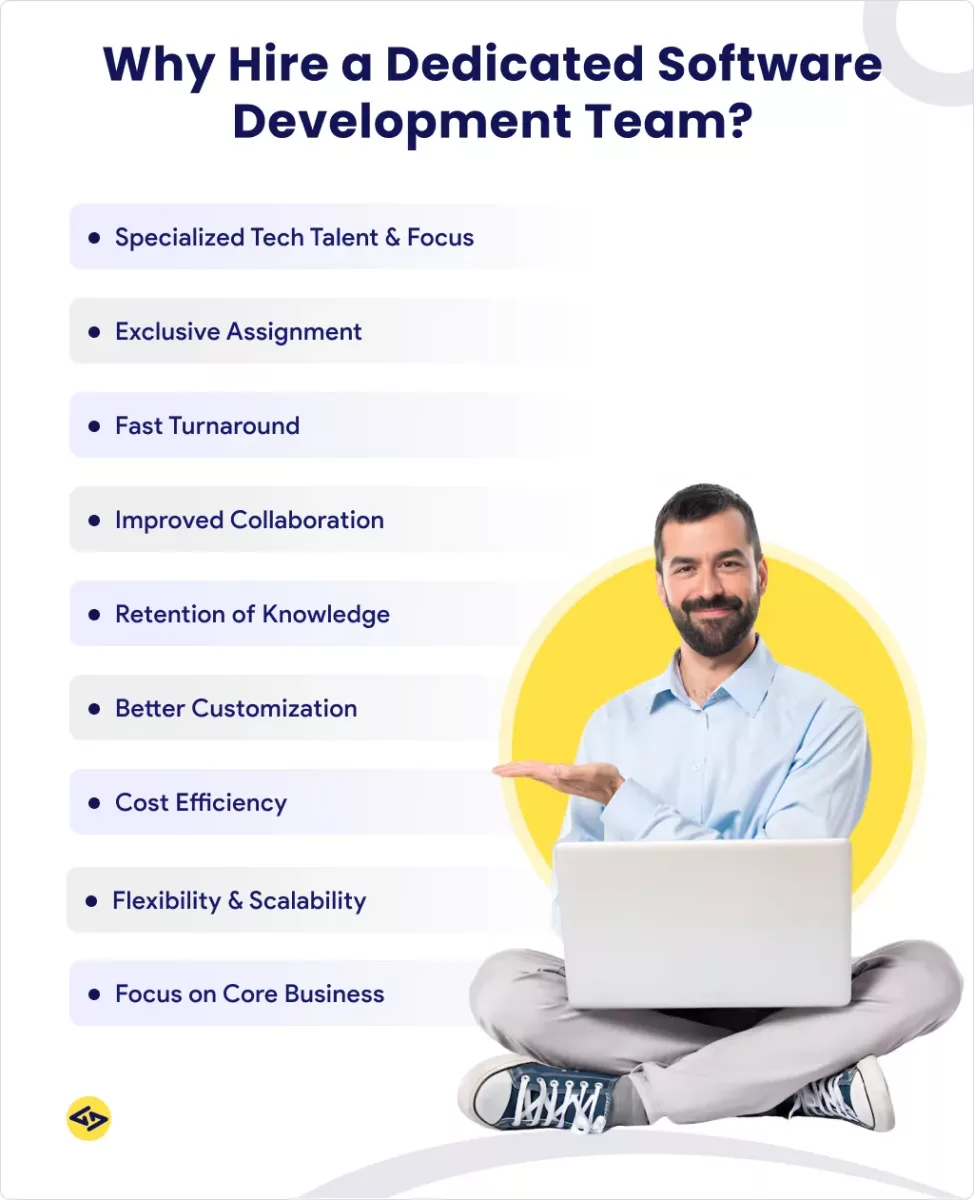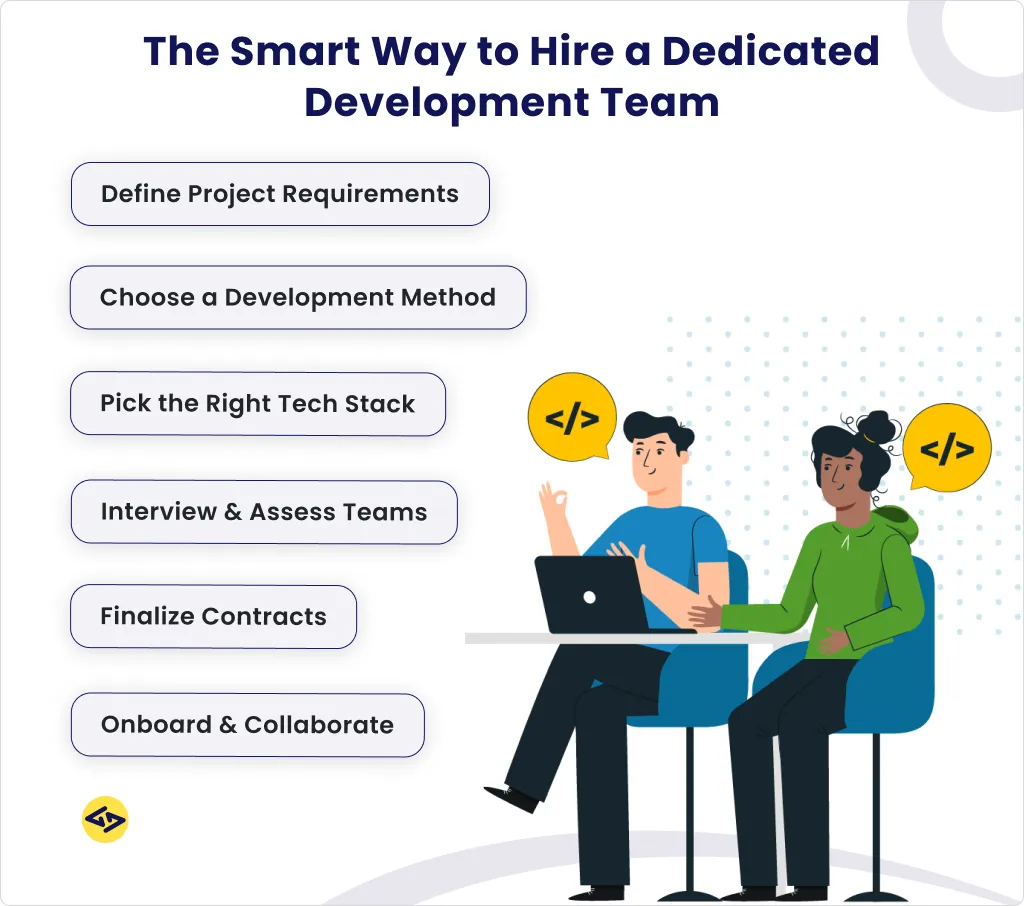Choosing the right development team is tough but crucial for your business. They will help you create reliable and professional software. A skilled software development team helps businesses stay competitive. They bring new ideas to life quickly and keep costs low.
According to a recent study, the web development market is now a $56 billion industry, projected to reach $101.54 billion by 2034. Why? Because every day, thousands of businesses are getting online and aim for a fast, reliable, and efficient website for their business.
Today, we’ll talk about hiring a dedicated software development company or team and the benefits that come with it. Along with this, we’ll discuss the key steps to consider when hiring a team for your project’s success.
By the end of this article, you’ll learn how to identify, evaluate, and onboard the perfect software development team for your business needs.
What is a dedicated software development team?
A dedicated software development company or team has skilled professionals and engineers. They focus entirely on one project.
When you hire a dedicated software development team, you get access to skilled professionals and engineers who focus entirely on one project. Unlike freelance developers, who work with multiple clients. These teams work exclusively for one client and invest all their energy in one thing.
Here’s what a dedicated software team usually includes:
- UI/UX designers: UI/UX designers create intuitive, visually appealing interfaces that enhance user experience and drive engagement.
- Programmers: Programmers write and optimize code following software engineering best practices and architectural guidelines. They ensure it fits software engineering and architecture. This leads to a clean, efficient, and optimized structure.
- Software architects: Software architects design software architecture to meet business needs. This includes improving performance, scalability, efficiency, security, and maintenance. For instance, they might design a microservices architecture for a growing e-commerce platform to handle increased traffic.
- Software testers: These experts are quality assurance testers rigorously test software functionality, identifying bugs and ensuring the final product meets high-quality standards before launch.
- Project managers: A project manager finds solutions, estimates costs and timelines, and tracks team progress. Project managers coordinate team activities, manage resources, communicate with stakeholders, and ensure projects stay on schedule and within budget.
A dedicated team handles the whole project development process. This includes planning, design, development, testing, and ongoing support. Whenever you run into a problem, find a bug, or face lag on your website, you have your team on stand-by.
Why hire a dedicated software development team?
The dedicated team model has gained significant traction among businesses for several compelling reasons:

1. Specialized tech talent and focus
You gain access to skilled developers with deep expertise in cutting-edge technologies like AI, blockchain, or cloud computing. Their singular focus on your project eliminates distractions, resulting in 30-40% faster development cycles compared to in-house teams.
2. Exclusive assignment
Many businesses experience project delays when developers split attention between multiple clients. These distractions often go unnoticed until deadlines are missed. Your project has a dedicated team. This means the developers focus entirely on your needs. There’s no hidden multitasking or divided attention. This ensures increased momentum and quicker delivery. This exclusive focus can reduce project timelines by up to 30% compared to shared resource models.
3. Fast turnaround
Dedicated teams are pre-assembled and ready to start immediately, eliminating the weeks typically needed for team formation and onboarding. This means they can jump in right away – without delay.
4. Improved collaboration
When you hire a dedicated team, they’ll ensure everything is on track and shared with your in-house team. They use clear communication, shared tools, and organized workflows. This results in quicker project completion, less downtime, and a smoother development cycle. Use tools and platforms like Slack, GitHub, and Jira for seamless communication and project tracking, ensuring transparency and alignment with your internal stakeholders.
5. Retention of knowledge
When software developers collaborate over time, they gain valuable insights into the product and the client’s business. This leads to fewer code errors. Developers know the software and process well, so they achieve better results. For instance, a team working on your e-commerce platform for months understands your customer behavior patterns and can suggest optimization features that a new developer might miss.
6. Better customization
These dedicated software developers are experts in delivering customized software. They can pivot development approaches mid-project, whether you need to add new features for a product launch or integrate with newly acquired systems.
7. Cost efficiency
Outsourcing to a software development company or a dedicated team can save you money. It removes the costs of hiring, training, and managing an in-house team. This approach allows you to achieve exceptional results while staying within your budget. A recent survey by Deloitte’s Global Outsourcing showed that companies save an average of 76% when outsourcing, compared to building an in-house team, when factoring in salaries, benefits, office space, and equipment.
8. Focus on the core business
Hiring dedicated developers lets them handle your software project. This way, your team can focus on key business priorities. While your dedicated team builds your mobile app, your internal team can focus on marketing strategy, customer acquisition, and business development.
Steps for Hiring a Dedicated Software Development Team
Following this systematic approach will help you avoid common pitfalls and ensure you select the right partners for your project.

1. Define Clear Project Requirements
Define your project’s scope, objectives, timeline, budget, and technical requirements. Identifying your requirements from the start allows you to hire a team with the appropriate technical expertise. Clarify your needs early. This helps avoid confusion and saves resources in development.
Create a detailed project brief document that includes user stories, feature lists, and success metrics. This becomes your roadmap for evaluating potential teams.
2. Choose Your Development Methodology
Choose a project management approach that is appropriate and relevant for your project. Here are some popular choices: The right methodology depends on your project complexity, timeline, and need for flexibility. Here are the most common approaches:
Agile focuses on flexibility, quick progress, and regular feedback. It’s great for projects that have changing needs. Choose Agile for innovative products where requirements may evolve, such as startup MVPs or experimental features.
Waterfall works best for projects with clear, fixed requirements and tight deadlines. Its structured and linear process helps keep everything on track. Waterfall suits well-defined projects like compliance software or system migrations where requirements are unlikely to change.
Consider adding other methodologies like Scrum or DevOps, and mention that hybrid approaches are also possible.
3. Choose the Right Technology Stack
The technology stack you choose should be appropriate and relevant to your project’s goals. Your technology stack should align with your project requirements, scalability needs, and long-term maintenance plans.
Here are some examples:
- React, Angular, and Vue for building responsive, interactive user interfaces.
- Node.js, Ruby on Rails, Express.js, and .NET Core for server-side logic and database management.
- Kotlin for native Android, Flutter, and React Native for cross-platform apps.
- Python, R, and MATLAB for data analysis, machine learning, and scientific computing.
A good tech stack boosts scalability, enhances security, and offers a smooth, easy experience for users. Consult with potential teams about technology recommendations based on your specific use case.
4. Research and shortlist potential teams
Look for a skilled team that has a proven record in your niche or relevant industry. Check their portfolio, read customer testimonials, and look at case studies. This will help you evaluate their skills and capabilities and hire the best. Use platforms like Clutch, GoodFirms, or LinkedIn to find teams with relevant experience. Look for case studies similar to your project scope and industry.
5. Interview and assess the vetted teams
Take your time to do interviews. The more time you spend here, the more chances you have of hiring the best fit for your business. Plan for multiple interview rounds: initial screening, technical assessment, and cultural fit evaluation.
Consider these factors:
- Technical expertise and relevant experience: Ask about specific technologies, project challenges they’ve solved, and their development processes.
- Soft skills: Communication skills, problem-solving approach, and ability to work across time zones if relevant.
- Company’s culture and values: Assess whether their work style and values complement your organization’s culture for long-term partnership success.
6. Negotiate Terms and Finalize Contracts
Once you pick your development team, the next step is to create a clear and organized contract. A well-structured contract protects both parties and sets clear expectations for the partnership.
- Define the scope of work: Include detailed deliverables, milestones, and acceptance criteria.
- Specify payment terms: Consider milestone-based payments or retainer models that align with your cash flow.
- Outline communication methods: Establish regular meeting schedules, reporting formats, and escalation procedures.
- Set project timelines: Include buffer time for revisions and unexpected challenges.
- Detail termination criteria: Define conditions and procedures for ending the partnership if needed.
- Include confidentiality clauses: Include NDAs, IP ownership agreements, and data security requirements.
7. Onboard and Integrate Your Dedicated Team
Once you choose your dedicated team, it’s time to smoothly integrate them into the software development process. Establish clear communication channels. Use efficient project management practices. Provide access to necessary tools, introduce them to key stakeholders, and establish regular check-in schedules. Consider a kickoff meeting to align everyone on project goals and expectations.
Conclusion
Hiring a dedicated software development team is a strategic investment that can transform your business outcomes, especially for complex or long-term projects. You gain access to a specialized talent pool, receive numerous benefits, and reduce costs. From a minimum of 40% savings to an average of 25% faster delivery times, the advantages are substantial.
Check out our detailed case study on DevLogic.nl custom software development to see how a dedicated team helped deliver a high-quality, scalable solution efficiently.
Ready to take the next step? Start by defining your project requirements and researching teams that specialize in your industry. The right partnership can accelerate your business growth and bring your vision to life faster than you imagined.
Ready to scale your team?
Hire dedicated developers who drive results.




